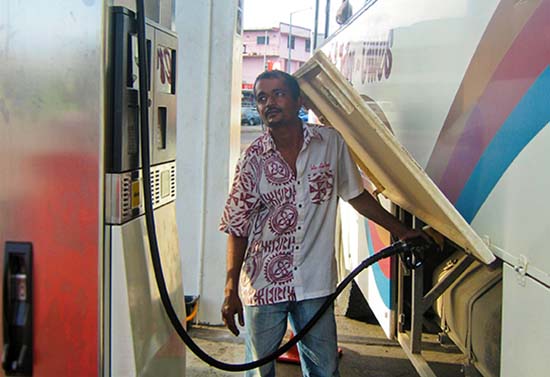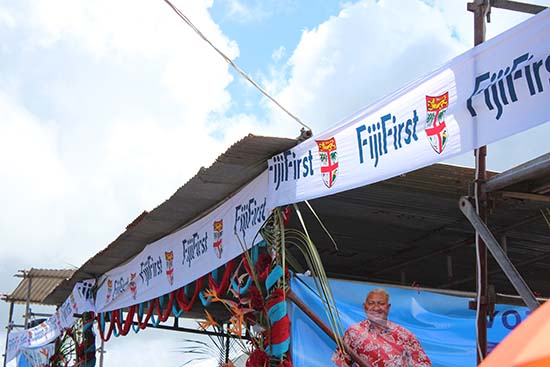
Mads Anneberg in Suva
A field in Valelevu outside Suva was on Saturday turned into a carnival-like rally for Fiji First with entertainment, hot dog stands and a Ferris wheel.
Being the last rally before the blackout period starts tomorrow, party leader and Prime Minister Voreqe Bainimarama and several other candidates took their time to explain to the people there why they should vote for Fiji First.
Well-known features of the party’s manifesto – such as free bus fares and a glass of milk a day for school children – were repeated over and over.
But a policy from the manifesto that has not gained much attention is one to nationalise the import of all fossil fuels – providing energy for most of Fiji, ranging from petrol for cars to coal for electricity.
In 2013, imports of gas oil and aviation fuel alone amounted to more than FJD $899 million.
Pacific Scoop asked Bainimarama why the government wished to take control of the imports.
“Well, we thought we would make it cheaper for people in Fiji. We will follow a model where we put out an international tender and sell the fuel to oil companies. That way the fuel will be a lot cheaper than now,” he said, referring to Mauritius as the role model.
But that is unlikely to be the outcome, says Professor Justus Haucap, director of the Institute for Competition Economics at University of Duesseldorf, Germany.
‘Too small’
“Fiji is way too small a country to impact on the fuel on fossil fuels on the worldwide market. I can’t see that the government would get cheaper or more reliable access than any private party would have,” he said.
“I am very, very sceptical that this could be beneficial for Fiji as a whole.”
Professor Haucap added that even Germany – with a population of almost 100 times that of Fiji’s 880,00 – would probably be too small to get any discounts if it implemented the same model.
Replying to the criticism, Bainimarama said: “That’s what your expert tells you.”
Pacific Scoop also asked Aiyaz Sayed-Khaiyum, general secretary of Fiji First, to respond to the claim that Fiji would be too small to exert buyer power over the sellers of fossil fuels and getting a lower price.
“I think that’s a silly question. It’s not about buyer power, it’s about making it cheaper. Obviously it can be done, and God willing, Fiji First wins, we will follow that model. It is sound economic decision making.”
Lowering costs
In its manifesto, Fiji First also states that the government will make revenue from the scheme and also lower the cost of doing business.
“It’s obvious that you can’t have your cake and eat it too. Either you lower the cost of doing business by subsidising fuel, but that means you have to take money out of the budget to finance this.
“Or you can say we want to generate money, but that means the money must come from somebody. Either from the people who buy the fuel or the products that are produced with the fuel, such as transport services, which then becomes more expensive,” said Professor Haucap.
Mobil Oil is one of the biggest importers of oil to Fiji. While the general manager of the company’s Fiji branch did not wish to be interviewed, the company did provide a press statement on the issue.
“The proposal would be a significant change for the industry, and we would hope for further consultation about any possible new arrangements impacting fuel supply,” it said.
Professor Haucap also warned that the move would not just be status quo but could have serious disadvantages.
First of all, it would give the government major control over the population who are dependent on energy. Secondly, he said, governments in general are not as experienced in buying on the private markets and lack accountability.
‘Lack of accountability’
“As we see around the world in many instances, if a government engages in purchasing it always becomes very difficult because government bureaucrats are not handling their own money in that sense. So there’s lack of accountability and reliability as opposed to people who have to take care of their private money,” he said.
Professor Haucap argues that the structure typically leads to inefficiency which translate to higher costs.
“And these have to be paid for by somebody. So either the taxpayers have to pay for the deficit or the consumers have to pay for an increase in price. And these are more or less the same people, so in the end the people of Fiji have to pay for it,” he said.
But that would not be a problem, said Sayed-Khaiyum.
“That’s quite a silly argument. It’s not a question of efficiency, it’s a question of having the ability to buy bulk. The government is not going to run the oil companies, it is simply going to be the main purchaser of fuel,” he said.
Sayed-Khaiyum also emphasised that one of the main goals was to stabilise prices in the interest of consumers, so there wouldn’t be sudden changes.
A recent report from the Secretariat of the Pacific Community (SPC) revealed that Fiji already has some of the lowest pre-tax prices on petrol and diesel in the Pacific – lower than the much larger market of New Zealand.
Mads Anneberg is an Inclusive Journalism Initiative (IJI) programme student at AUT University. He is reporting on the Asia-Pacific journalism course. He is on internship at Repúblika Magazine where he is a Fiji elections reporter.




